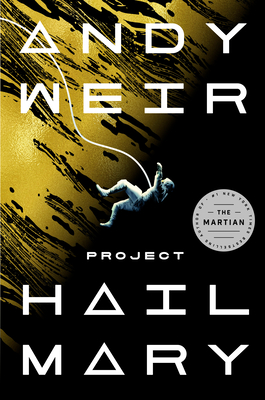Review: Andy Weir’s “Project Hail Mary”
by Miles Raymer

I belong to the tiny fraction of science fiction enthusiasts who didn’t read Andy Weir’s phenomenally-successful breakout novel, The Martian. For whatever reason, it just didn’t appeal to me, although I enjoyed the film adaptation. But when my wife, friends, and favorite podcasters started gushing about Project Hail Mary, I decided it was time to send myself rocketing into Weir’s geeky orbit.
This smart and compelling novel kicks off with a disturbing discovery: Sol, Earth’s sun, is being consumed by a bizarre, voracious microorganism. This causes Sol’s energy output to start diminishing at an alarming rate, portending all manner of nasty consequences for the biosphere and human civilization; at one point, a renowned climate scientist predicts that half of humanity’s population will be dead within nineteen years if the trend proceeds unabated. Caught in the middle of this nightmarish shitshow is Ryland Grace, our protagonist. This PhD-turned-gradeschool-science-teacher is a total dreamboat––picture The Rock but with beautifully-bulging brains instead of rippling brawn. Through a series of relatively implausible but exciting events, Grace becomes Earth’s best hope for survival.
I’ll keep this review vague to avoid spoilers, but I want to call out two central attributes that drew me in and kept me engaged until the last page. The first is that Project Hail Mary is a fictional masterclass in inductive reasoning. To save the world, Grace and his compatriots must enact the classic scientific process of using a series of specific observations to derive general rules about what the fuck is going on. To be accurate, there’s plenty of deductive reasoning happening as well, but I think the many clever examples of induction are the book’s strongest intellectual assets. This takes place in stages as the novel progresses along two distinct timelines, with each new phase of learning building on those that came before. Although he’s not much of a writer, Weir possesses an impressive understanding of biology and physics that propels his story with elegant ease. It’s that rare sort of scifi novel that’s equal parts education and entertainment, never sacrificing one for the other.
The second feature that makes Project Hail Mary special is the unexpected friendship that constitutes the emotional apogee of Weir’s narrative. Without giving too much away, let’s just say that a one-man suicide mission turns quickly into a two-”person” journey that explores the tension between intimate social connection and the ethical context of the greater good in which individual relationships play out. Weir is boldly optimistic in his portrait of two cosmic strangers who immediately recognize one another’s value, intelligence, and collaborative potential. The ease with which they connect may irritate more pessimistic readers, but it totally worked for me as a form of science-driven interpersonal wish fulfillment. This is hands down the most endearing instance of interstellar camaraderie I have encountered––I’m talking full-blown tears of joy in the novel’s final act, elicited not by the “success” of the mission, but by Weir’s heartfelt depiction of the mutual respect and love that is the cornerstone of every great friendship.
I could spend a few sentences griping about some minor details that annoyed me, or places where I think Weir doesn’t quite confront the full implications of his premise. But those critiques really don’t matter in the context of this novel’s many top-notch qualities, so I won’t waste my time or yours. If you’re looking for that “gotta read something fun on my post-pandemic vacation” novel, you can end your search here.
Rating: 9/10